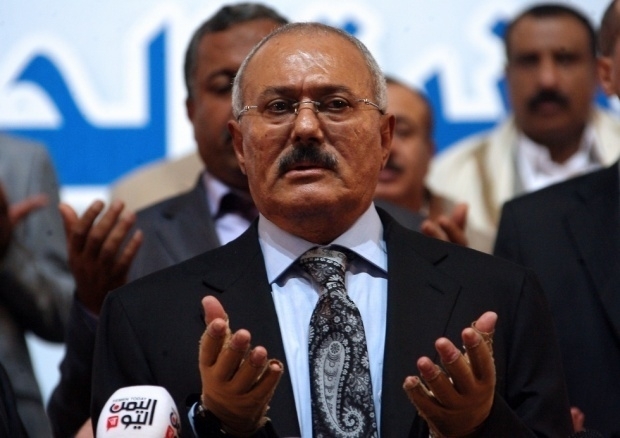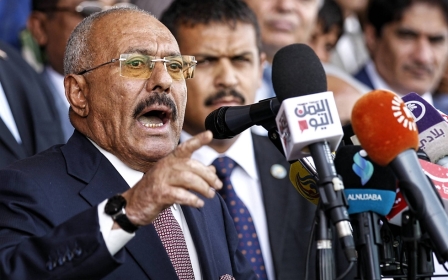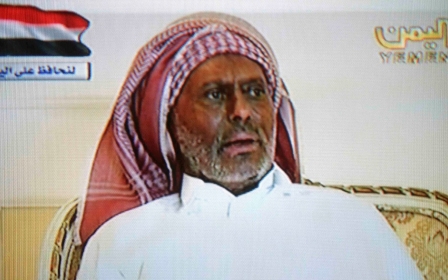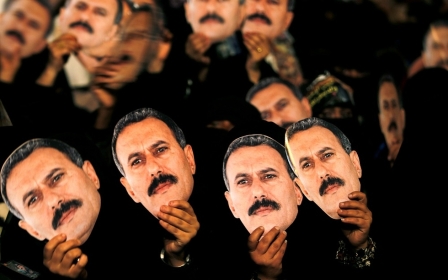Yemen's Houthis free two sons of Ali Abdullah Saleh

SANAA - Two of the assassinated former Yemeni president Ali Abdullah Saleh’s sons were released by the Houthi rebels on Wednesday, an official source told Middle East Eye.
Salah and Maydan Saleh were captured by the Houthis in December when their father’s forces turned against the rebels in a conflict that cost the elder Saleh his life.
When Saleh, who had shown indications that he would join forces with those of Saudi-backed Yemeni President Abd Rabbuh Mansour Hadi, was assassinated by his erstwhile allies, several of his General People’s Congress (GPC) party leadership were captured.
A source in the Houthi-run interior ministry in the capital Sanaa confirmed to MEE that Salah and Maydan have been released. A GPC source said Saleh's sons were released following Omani mediation efforts.
"They were released by a presidential pardon issued by president of the [Houthi] Supreme Political Council, Mahdi al-Mashat, and they will leave Sanaa today on a UN plane from Sanaa airport," the source said.
I think the Houthis released the sons of Saleh in this time for a ransom, which can help them to overcome the current economic crisis
- Mohammed Ali, political commentator
The source gave no information about where the plane was headed.
The source in the GPC said Saleh's brother Mohammed and the son of his nephew Tareq, Afash, are still detained by the Houthis.
A senior Omani source also confirmed to MEE that the release of the two was assisted through Oman mediation.
Held for ransom
Mohammed Ali, a seasoned Yemeni journalist and political commentator, told MEE that the Houthis likely released the brothers after receiving a ransom.
"I think the Houthis released the sons of Saleh in this time for a ransom, which can help them to overcome the current economic crisis," he said.
The Houthis – and Yemen as a whole – are suffering under an economic crisis, as a Saudi blockade chokes the country of imports and the Yemeni rial plummets in value.
"It is impossible that the Houthis would release Saleh’s sons without receiving anything. We have heard about several mediators sent to the Houthis to release Saleh's sons for a huge amount."
"Saleh's wealth was more than $60 billion, and this wealth now lies with his sons living outside Yemen, so they will not hesitate to pay a ransom to free their brothers."
Though the majority of Saleh’s family lives abroad, his nephew, Tareq, remains in the country, now fighting alongside pro-Yemeni government forces against the Houthi rebels.
He is playing a key role in the Emirati-led assault on Hodeidah, a highly strategic port city on Yemen’s Red Sea coast.
Ali Abdullah Saleh ruled Yemen for decades, but was forced from power during the tumultuous “Arab Spring” protests of 2011.
He saw his chance to return to power in 2014, however, allying with the Houthis as they began to overrun the country, capturing key areas including Sanaa and forcing the internationally recognised government into exile.
In 2015, UN experts said Saleh had amassed a fortune of $30bn-$62bn in assets. After he switched allegiances in Yemen's conflict from the Houthis to the Saudi-led coalition, he was killed in December by the Iran-aligned group.
Middle East Eye propose une couverture et une analyse indépendantes et incomparables du Moyen-Orient, de l’Afrique du Nord et d’autres régions du monde. Pour en savoir plus sur la reprise de ce contenu et les frais qui s’appliquent, veuillez remplir ce formulaire [en anglais]. Pour en savoir plus sur MEE, cliquez ici [en anglais].




